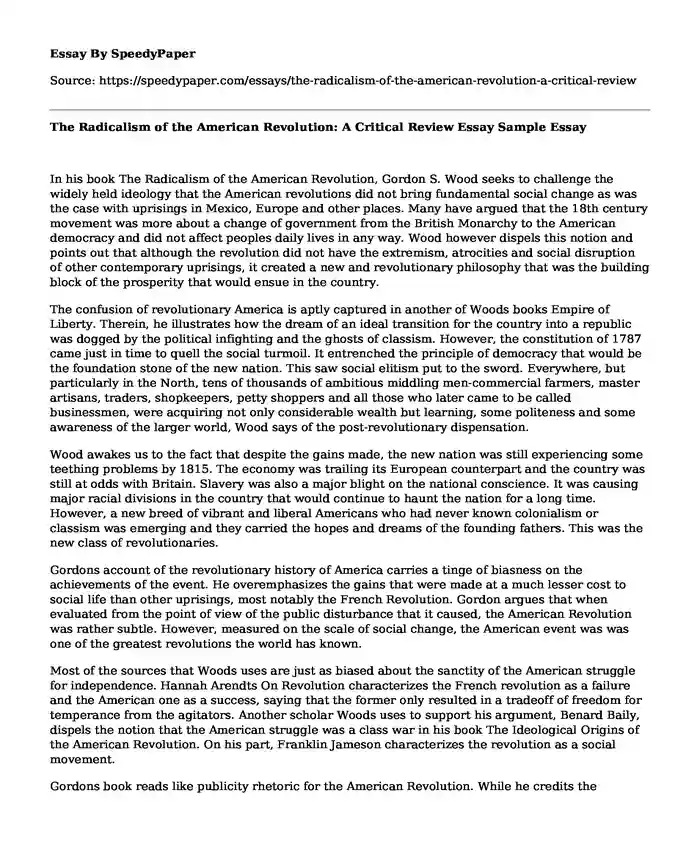
| Type of paper: | Essay |
| Categories: | History United States American revolution |
| Pages: | 3 |
| Wordcount: | 800 words |
In his book The Radicalism of the American Revolution, Gordon S. Wood seeks to challenge the widely held ideology that the American revolutions did not bring fundamental social change as was the case with uprisings in Mexico, Europe and other places. Many have argued that the 18th century movement was more about a change of government from the British Monarchy to the American democracy and did not affect peoples daily lives in any way. Wood however dispels this notion and points out that although the revolution did not have the extremism, atrocities and social disruption of other contemporary uprisings, it created a new and revolutionary philosophy that was the building block of the prosperity that would ensue in the country.
The confusion of revolutionary America is aptly captured in another of Woods books Empire of Liberty. Therein, he illustrates how the dream of an ideal transition for the country into a republic was dogged by the political infighting and the ghosts of classism. However, the constitution of 1787 came just in time to quell the social turmoil. It entrenched the principle of democracy that would be the foundation stone of the new nation. This saw social elitism put to the sword. Everywhere, but particularly in the North, tens of thousands of ambitious middling men-commercial farmers, master artisans, traders, shopkeepers, petty shoppers and all those who later came to be called businessmen, were acquiring not only considerable wealth but learning, some politeness and some awareness of the larger world, Wood says of the post-revolutionary dispensation.
Wood awakes us to the fact that despite the gains made, the new nation was still experiencing some teething problems by 1815. The economy was trailing its European counterpart and the country was still at odds with Britain. Slavery was also a major blight on the national conscience. It was causing major racial divisions in the country that would continue to haunt the nation for a long time. However, a new breed of vibrant and liberal Americans who had never known colonialism or classism was emerging and they carried the hopes and dreams of the founding fathers. This was the new class of revolutionaries.
Gordons account of the revolutionary history of America carries a tinge of biasness on the achievements of the event. He overemphasizes the gains that were made at a much lesser cost to social life than other uprisings, most notably the French Revolution. Gordon argues that when evaluated from the point of view of the public disturbance that it caused, the American Revolution was rather subtle. However, measured on the scale of social change, the American event was was one of the greatest revolutions the world has known.
Most of the sources that Woods uses are just as biased about the sanctity of the American struggle for independence. Hannah Arendts On Revolution characterizes the French revolution as a failure and the American one as a success, saying that the former only resulted in a tradeoff of freedom for temperance from the agitators. Another scholar Woods uses to support his argument, Benard Baily, dispels the notion that the American struggle was a class war in his book The Ideological Origins of the American Revolution. On his part, Franklin Jameson characterizes the revolution as a social movement.
Gordons book reads like publicity rhetoric for the American Revolution. While he credits the movement for the end of European-styled caste system, he fails to point out how the vice only mutated into a modern form of oligarchy fueled by the capitalism that was spawned by the revolution. In addition, the change failed to end other forms of discrimination such as slavery and sexism that would continue to plague the country long after it had happened. Therefore for a section of the America population, the revolution only marked a transition from one ruthless master to another. Only that this time, the oppression was propagated within the confines of a constitution that was supposed to safeguard equality for all. In the case of slavery, another bloody war had to be fought in order to liberate one race from the dominion of another. Indeed, some of the founding fathers such as Jefferson supported racial superiority.
Conspicuous in Woods work is role of the minority classes in the revolution. He credits the achievements of the event to the elites who would later subjugate the lower caste. Gordon seems obsessed with sticking the radical tag to the revolution that he is unable to provide a good enough critical assessment of it. However, despite these shortcomings, the book succeeds in showing us the pains of nation building that the founding fathers had to go through in to achieve a loosely cohesive state. These are more often than not overshadowed by the lack of the blood-letting and sabotage that made the French Revolution so conspicuous.
Cite this page
The Radicalism of the American Revolution: A Critical Review Essay Sample. (2019, Nov 12). Retrieved from https://speedypaper.com/essays/the-radicalism-of-the-american-revolution-a-critical-review
Request Removal
If you are the original author of this essay and no longer wish to have it published on the SpeedyPaper website, please click below to request its removal:
- Essay Sample about Importance of Sports for Teenagers
- Free Essay Analyzing the Leadership in the Movie Gladiator
- Free Essay on the Tarasoff Case
- Essay Sample: Should World War II Be Remembered in American History as the "Good War"?
- Strengthening Writing Skills According to the Vermont Writing Collaborative - Essay Sample
- Essay Example. Competitive Business-Level Strategies
- Free Essay - Use of Business Intelligence in Healthcare
Popular categories




